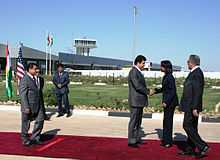Nechervan Idris Barzani
| Nechirvan Idris Barzani نێچیرڤان بهرزانی | |
|---|---|
| Prime Minister of Kurdistan Regional Government | |
| Incumbent | |
| Assumed office 7 March 2012[1] | |
| President | Massoud Barzani |
| Preceded by | Barham Salih |
| In office 1 March 2006 – 31 August 2009 | |
| President | Massoud Barzani |
| Preceded by | Post Created |
| Succeeded by | Barham Salih |
| 2nd Prime Minister of KDP-controlled Kurdistan | |
| In office 20 December 1999 – 14 June 2005 | |
| President | Massoud Barzani |
| Preceded by | Rowsch Shaways |
| Succeeded by | Position Abolished |
| Personal details | |
| Born | 21 September 1966 Barzan, Iraq |
| Nationality | Iraqi |
| Political party | Kurdistan Democratic Party |
| Spouse(s) | Nabila Barzani |
| Residence | Erbil |
| Religion | Sunni Islam |
Nechirvan Idris Barzani (Kurdish: نێچیرڤان بهرزانی), or Kurdish: Nêçîrvan Îdrîs Barzanî) (born 21 September 1966) is the prime minister of the Kurdistan Regional Government of Iraqi Kurdistan. He served as prime minister from March 2006 to August 2009 and was appointed again in March 2012.
Early years
Barzani was born in 1966 in the Barzan region of Iraqi Kurdistan.[2] The word Nêçîr means hunt in the Kurdish language, and Nêçîrvan means the hunter. Also, the word Naxçir means hunt in Persian and Naxçirban means hunter. This is a name used for ethnic Kurdish males. Barzani as a surname reflects the individual's origin from Barzan. In 1974, his family was forced into exile in Iran. He often accompanied his father, Idris, on official visits to Middle Eastern and European countries, a foreshadowing of his future political career. Following the sudden death of his father, he took up an active role in Kurdish politics, working in PDK youth organizations. He is the grandson of PDK (Kurdistan Democratic Party) founder Mustafa Barzani as well as nephew of the current president of the Iraqi Kurdistan Region, Massoud Barzani.[2]d
Political activity
Barzani was elected to the KDP central committee at its 10th Congress in 1989 and re-elected at the 11th Congress in 1993, when he assumed a position in the political bureau. After the 1991 Gulf War, he participated in the negotiations with the Iraqi government. In 1996, he was appointed deputy prime minister of the Kurdistan Democratic Party's controlled region in Iraqi Kurdistan. Following the unification process in 2005 between the main Kurdish parties and the formation of the Kurdistan Regional Government (KRG), elections were held. In 2006, Barzani was selected as the Prime Minister of the KRG. His term was expected to end in 2008 but after an agreement by the majority coalition in power, Barzani's term was extended until the elections of 2009.
From September 2009 to January 2012, a Kurdish politician from the ruling KDP-PUK coalition, Barham Salih, replaced Barzani as prime minister. Barzani was reappointed as prime minister in 2012 as part of a political agreement by the ruling coalition.[1]
Many of Barzani's supporters believe that he played an important role in developing the Kurdistan Region. During his first term as prime minister, his supporters nicknamed his cabinet as, "The Development Cabinet" praising his work in the development of the Kurdistan region.[3]
Personal life
Washington & Jefferson College presented Barzani with honorary degree and the ceremony was held on May 17, 2008.[3]
| Wikimedia Commons has media related to Nechervan Idris Barzani. |
References
- ↑ 1.0 1.1 Razzouk, Nayla (5 March 2012). "Nechirvan Barzani to Take Over as Iraq Kurd Premier on March 7". Bloomberg.
- ↑ 2.0 2.1 Rubin, Michael (October 2002). "Interview: Nechervan Idris Barzani". Middle East Intelligence Bulletin 4 (10). Retrieved 15 June 2012.
- ↑ 3.0 3.1 http://www.washjeff.edu/content.aspx?section=2210&menu_id=517&crumb=518&page_title=Current%20Press%20Releases&id=11678

| Political offices | ||
|---|---|---|
| Preceded by Post Created |
Prime Minister of Iraqi Kurdistan 2006–2009 |
Succeeded by Barham Salih |
| Preceded by Barham Salih |
Prime Minister of Iraqi Kurdistan 2012 |
Succeeded by Incumbent |
| Preceded by Rowsch Shaways |
Prime Minister of KDP-controlled Kurdistan 1999–2005 |
Succeeded by Position Abolished |